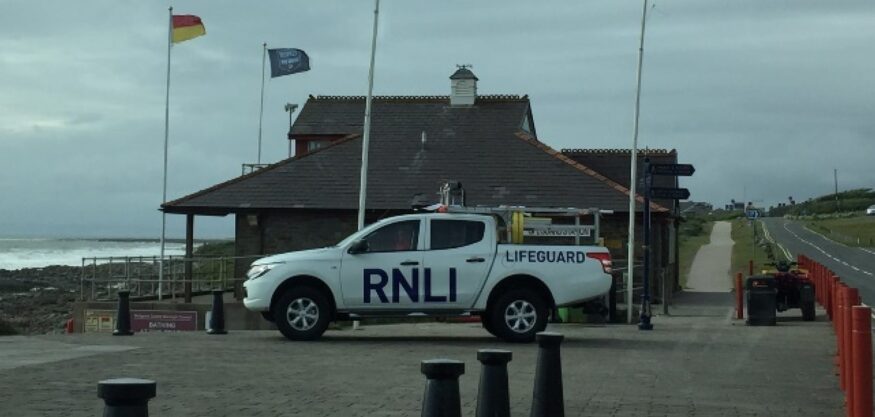The Royal National Lifeboat Institution (RNLI) and HM Coastguard are today (Friday 3 July) launching a new beach safety campaign in Wales, urging parents to protect their families by following key safety advice to save lives this summer.
With previously announced changes by the Welsh Government coming into effect on Monday, It is important that any trip to the beach this summer is met with caution and the message from the RNLI is clear; always follow Welsh Government advice and keep yourself and your family safe.
RNLI lifeguards resumed patrols on 14 beaches in Wales last month, and the charity will return to a further 12 beaches from tomorrow (4 July). This will take the total number of RNLI lifeguarded beaches in Wales to 26 in time for the summer peak season. In the area Porthcawl RNLI lifeboat operates RNLI lifeguard patrols have already started at Rest Bay; from 4 July patrols will also resume at Sandy Bay, Trecco Bay and Ogmore Beaches.
On Welsh beaches in 2019, RNLI lifeguards aided 4801 people in 1850 incidents, saving a total of 39 lives.
RNLI lifeguards around the UK and Ireland helped to reunite nearly 1,800 lost children and teenagers with their families and aided 346 people in incidents involving inflatables.
RNLI Lifesaving Manager for Wales, Matt Crofts, said: ‘As changes to the Welsh Government restrictions come into effect from Monday, more people are expected to visit the coast to exercise and take part in water-based activities. The first few weeks of having lifeguards back on Welsh beaches has helped the RNLI properly test new ways of operating put in place to manage the risks of Coronavirus and have allowed us to accelerate and expand our plans here in Wales this summer.
‘Our ability to do this in Wales has also been helped by the regular dialogue between the RNLI and Welsh Government, the approach to easing restrictions and the caution and responsibility shown by the people of Wales.’
‘I would like to extend my thanks to lifeboat stations in Wales for maintaining service throughout the pandemic and whilst RNLI lifeboat crews and HM Coastguard are still on call ready to respond to emergencies, the message is clear; we need the public to be aware of dangers, take responsibility for themselves and their loved ones and remember that, in an emergency, call 999 and ask for the Coastguard.’
Claire Hughes, director of HM Coastguard said: ‘We know from sad experience that whether you’re local or not, whatever your ability of experience in your chosen sport or leisure activity, the sea can still catch you out and be unmerciful when it does. Now, more than ever we need people to respect the sea and the coast.
‘If you get into trouble call 999 and ask for the Coastguard and we will come to your aid. But coronavirus hasn’t gone away, and we all need to follow the rules. Remember your choices might put people, including yourself and frontline responders, at risk. Take extra care in these extraordinary times.’
Chris Cousens, RNLI Water Safety Lead for Wales, said: ‘It is important that anyone visiting the coast understands the hazards of the environment and you must take more responsibility for you and your family this summer. No one ever goes to the coast to be rescued yet RNLI lifeguards rescue 1000s each year.’
Following key safety advice will keep people safe and help to reduce the demands placed on RNLI lifeboat crews, lifeguards, HM Coastguard and other emergency services.
That is why parents are now being urged to take charge and be ‘beach safe’ if they visit the coast to ensure they and their families have the safest summer possible, whether lifeguards are patrolling their beach or not.
The RNLI and HM Coastguard are advising the public not to use inflatables at all and for everyone, especially parents, planning a visit to a beach or the coast to follow this safety advice:
If you can, please visit a lifeguarded beach. But wherever you are;
- Have a plan – check the weather forecast, tide times and read local hazard signage
- Keep a close eye on your family – on the beach and in the water
- Don’t allow your family to swim alone
- Don’t use inflatables
- If you fall into the water unexpectedly, FLOAT TO LIVE. Fight your instinct to thrash around, lean back, extend your arms and legs, and Float
- In an emergency dial 999, and ask for the Coastguard



Get Social